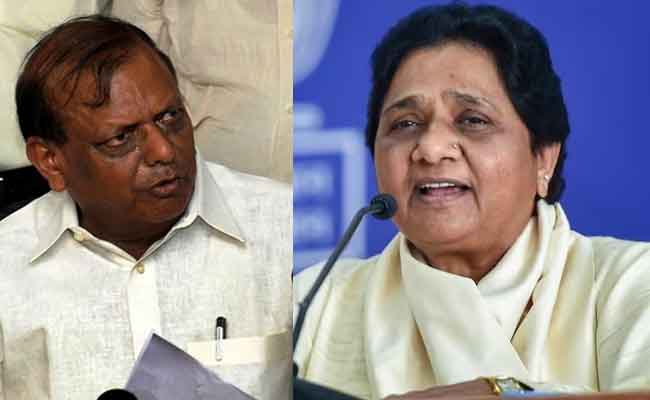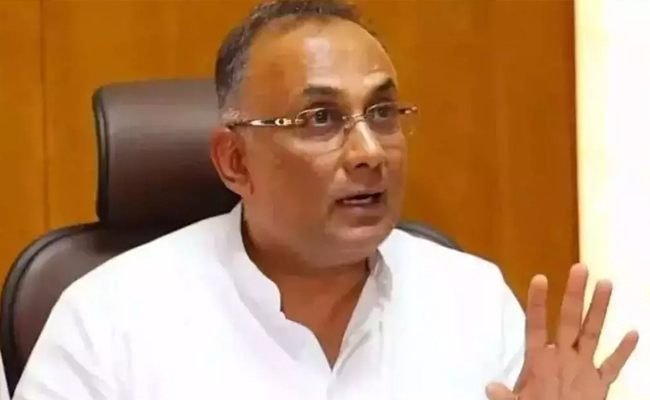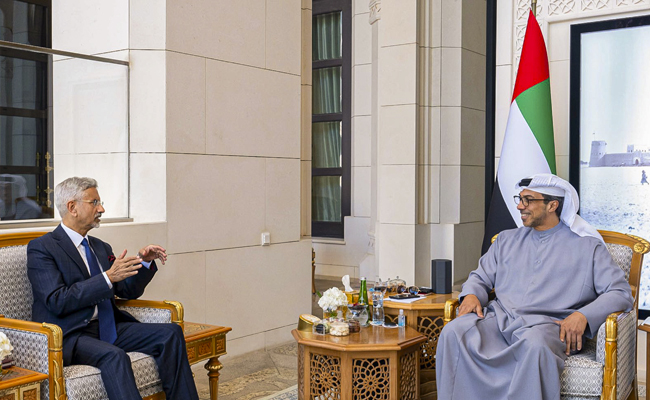Lucknow (PTI): Newly elected Samajwadi Party (SP) MP R K Chaudhary, one of the founders of the Bahujan Samaj Party (BSP), has claimed BSP chief Mayawati has been ignoring the Bahujan movement which has led to her party's rout in these Lok Sabha polls.
Now, SP chief Akhilesh Yadav is taking forward the Bahujan movement, demanding social equality for backward castes and disadvantaged communities, with the slogan of 'PDA' (backward, Dalit and minority), said Chaudhary, a four-time MLA and former state minister who is counted among Uttar Pradesh's prominent Dalit leaders.
In a conversation with PTI, Choudhary, who has been elected MP from the Mohanlalganj seat on an SP ticket, discussed among other things the BSP's falling graph and what future holds for the party founded by Kanshi Ram.
According to him, the core Dalit politics in Uttar Pradesh has become leaderless at the moment, but in the coming times, the SP will carry forward the flame of Bahujanism awakened by Kanshi Ram.
When asked about the reasons for the BSP not being able to win even one seat in the recent Lok Sabha elections, Choudhary said, "Mayawati ji has been our leader. We respect her. But if anyone has ended Kanshi Ram ji's movement, it is Behen ji (Mayawati). Now, SP chief Akhilesh Yadav has started walking on the path of taking that movement forward."
Claiming that the SP a got considerable share of Dalit votes in the Lok Sabha elections, he said, "The SP this time got the core vote of the Bahujan Samaj Party without asking for it."
"Somewhere, it got 50 per cent and somewhere it got 60 per cent (of the Dalit votes). This is not an ordinary thing. And in the coming times, the Samajwadi Party, under the leadership of Akhilesh Yadav, will definitely fulfill the dream that BSP founder Kanshi Ram ignited."
The BSP, the party which has formed government in Uttar Pradesh four times, could not win a single seat in the recently concluded Lok Sabha elections. Its votes share also took a massive hit of more than 10 percentage points from the 2019 elections, when it had won 10 seats, to stand at 9.39 percent.
Choudhary was once a very close associate of BSP founder Kanshi Ram. He has also served as minister in all the four previous BSP governments in the state.
In this Lok Sabha election, he defeated Union Minister and BJP leader Kaushal Kishore by more than 70,000 votes from the Mohanlalganj seat in the state capital. BSP candidate Rajesh Kumar got 88,461 votes and stood third.
"When Kanshi Ram was there, he was capable of running Babasaheb Ambedkar's mission, but the Bahujan Samaj was then not mentally prepared for it," Chaudhary said.
"Today, this society knows about the Constitution and reservation but now there is no one to lead them. As far as the core Dalit leadership position is concerned, I think the space is vacant and whoever makes efforts will lead them," he said.
"Dalits believe in Babasaheb Ambedkar, they believed in Kanshi Ram ji as well. Now Kanshi Ram is no more, so Dalits are left feeling cheated and are wondering what to do," he said.
"I think that there used to be a slogan that the one who will talk about Bahujan will rule Delhi. Now the slogan that is being raised is that the one who will talk about PDA (backward, Dalit, minority) will rule Delhi," he said, describing the SP as the current torchbearer for the community.
SP President Akhilesh Yadav had given the slogan of PDA in the Lok Sabha elections and said that the SP will take forward the fight of these classes.
Chaudhary said, "Earlier, there was a slogan that Baba (Ambedkar) your mission is incomplete, Kanshi Ram will complete it. The mission is going on. Kanshi Ram ji is no more now. So now the slogan has become that Baba your mission is incomplete, we all together will complete it.''
"The path that BSP founder Kanshi Ram found, that the Bahujan Samaj should be brought together to form a political force, our leader Akhilesh Yadav has taken the same path and talked about PDA. This is the society which has been looted and it remained weak and helpless for centuries. After the formation of PDA, the process of change has started. It will move forward.''
"Our target was to remove the BJP government from power at the centre, but it did not happen. But we have succeeded in giving a blow to the BJP. Earlier, there used to be a strong BJP government at the centre, but now there is a weak government. Sooner or later, within six months, this government will fall and the INDIA (Indian National Developmental Inclusive Alliance) coalition government will be formed," he said
When asked about the BJP not getting the expected success in Uttar Pradesh in the recently concluded Lok Sabha elections, the former minister said, "The BJP does only Hindu-Muslim politics in the country. The BJP has had to bear the brunt of this politics in this election. If they do not stop this, they will have to suffer more."
Let the Truth be known. If you read VB and like VB, please be a VB Supporter and Help us deliver the Truth to one and all.
New Delhi: A bill to set up a 13-member body to regulate institutions of higher education was introduced in the Lok Sabha on Monday.
Union Education Minister Dharmendra Pradhan introduced the Viksit Bharat Shiksha Adhishthan Bill, which seeks to establish an overarching higher education commission along with three councils for regulation, accreditation, and ensuring academic standards for universities and higher education institutions in India.
Meanwhile, the move drew strong opposition, with members warning that it could weaken institutional autonomy and result in excessive centralisation of higher education in India.
The Viksit Bharat Shiksha Adhishthan Bill, 2025, earlier known as the Higher Education Council of India (HECI) Bill, has been introduced in line with the National Education Policy (NEP) 2020.
The proposed legislation seeks to merge three existing regulatory bodies, the University Grants Commission (UGC), the All India Council for Technical Education (AICTE), and the National Council for Teacher Education (NCTE), into a single unified body called the Viksit Bharat Shiksha Adhishthan.
At present, the UGC regulates non-technical higher education institutions, the AICTE oversees technical education, and the NCTE governs teacher education in India.
Under the proposed framework, the new commission will function through three separate councils responsible for regulation, accreditation, and the maintenance of academic standards across universities and higher education institutions in the country.
According to the Bill, the present challenges faced by higher educational institutions due to the multiplicity of regulators having non-harmonised regulatory approval protocols will be done away with.
The higher education commission, which will be headed by a chairperson appointed by the President of India, will cover all central universities and colleges under it, institutes of national importance functioning under the administrative purview of the Ministry of Education, including IITs, NITs, IISc, IISERs, IIMs, and IIITs.
At present, IITs and IIMs are not regulated by the University Grants Commission (UGC).
Government to refer bill to JPC; Oppn slams it
The government has expressed its willingness to refer it to a joint committee after several members of the Lok Sabha expressed strong opposition to the Bill, stating that they were not given time to study its provisions.
Responding to the opposition, Parliamentary Affairs Minister Kiren Rijiju said the government intends to refer the Bill to a Joint Parliamentary Committee (JPC) for detailed examination.
Congress Lok Sabha MP Manish Tewari warned that the Bill could result in “excessive centralisation” of higher education. He argued that the proposed law violates the constitutional division of legislative powers between the Union and the states.
According to him, the Bill goes beyond setting academic standards and intrudes into areas such as administration, affiliation, and the establishment and closure of university campuses. These matters, he said, fall under Entry 25 of the Concurrent List and Entry 32 of the State List, which cover the incorporation and regulation of state universities.
Tewari further stated that the Bill suffers from “excessive delegation of legislative power” to the proposed commission. He pointed out that crucial aspects such as accreditation frameworks, degree-granting powers, penalties, institutional autonomy, and even the supersession of institutions are left to be decided through rules, regulations, and executive directions. He argued that this amounts to a violation of established constitutional principles governing delegated legislation.
Under the Bill, the regulatory council will have the power to impose heavy penalties on higher education institutions for violating provisions of the Act or related rules. Penalties range from ₹10 lakh to ₹75 lakh for repeated violations, while establishing an institution without approval from the commission or the state government could attract a fine of up to ₹2 crore.
Concerns were also raised by members from southern states over the Hindi nomenclature of the Bill. N.K. Premachandran, an MP from the Revolutionary Socialist Party representing Kollam in Kerala, said even the name of the Bill was difficult to pronounce.
He pointed out that under Article 348 of the Constitution, the text of any Bill introduced in Parliament must be in English unless Parliament decides otherwise.
DMK MP T.M. Selvaganapathy also criticised the government for naming laws and schemes only in Hindi. He said the Constitution clearly mandates that the nomenclature of a Bill should be in English so that citizens across the country can understand its intent.
Congress MP S. Jothimani from Tamil Nadu’s Karur constituency described the Bill as another attempt to impose Hindi and termed it “an attack on federalism.”



_vb_22.jpeg)

